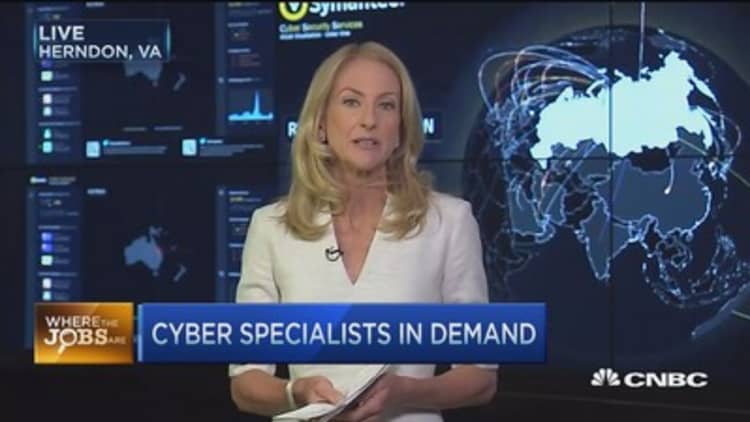
As a welder, 30-year-old Richard Hobson, spent his days fusing metals together to create secure joints. Today he is an intern working on securing Morgan Stanley's data.
"We are looking for any vulnerabilities, any threats that can compromise personal information and data that is highly regarded in that organization," he said.
Hobson is a graduate of a program developed by the security giant Symantec and the nonprofit NPower. Called SC3, (Symantec Cyber Career Connection), the program aims to train a pipeline of workers who could eventually become cyberspecialists, a rapidly growing area of the tech world.
"Over the last five years, there's been a 90 percent increase in demand for cybersecurity professionals," said Matthew Sigelman, CEO of Burning Glass Technologies, which analyzes jobs data. "That's three times the growth that we've seen for IT jobs overall."
Fueling demand for cybersecurity specialists is the now nearly constant attacks faced by businesses, not only in America, but around the world. These attacks are costing businesses between $400 million and $500 million a year in direct damage, disruption and recovery, according to the insurer Lloyd's.
The need to secure the data cybercriminals are after will create 6 million cybersecurity jobs by 2019, according to Symantec CEO Michael Brown. Unfortunately, Brown predicts there will only be 4 ½ million people qualified to fill these jobs.
"As you can imagine, the market's hot right now 'cause every time you open up a newspaper, there's another cybersecurity attack going on," said Symantec's chief human resources officer, Amy Cappellanti-Wolf. "So it's a very lucrative field for that talent."
Burning Glass's Sigelman said cyberspecialist jobs pay an average of $84,000, about 9 percent, or $6,500, more than traditional IT jobs. They also take about three times as long to fill.
"About 84 percent of cybersecurity jobs require a college degree, 70 percent of them require multiple years of experience in a field that really didn't exist multiple years ago," said Sigelman.
Some cyberspecialist jobs also require certifications and more importantly, a deep knowledge of the industry they work in such as finance, health care or retail. In short, bridging the talent gap is a long-term problem where there is no quick fix.
For Symantec, Cappellanti-Wolf said the company's position as a leader in data security allows it to recruit top talent. But even with the work it's doing with universities and colleges to develop programs to train more potential cyberwarriors, the company knows it needs to do more.
That is why Mountain View, California-based Symantec partnered with NPower to create SC3.
"So it's been over a year that we've launched the program, and this past year we had 31 graduates," Cappellanti-Wolf said. "About a third of them have been women and the other two-thirds have been people of color that normally wouldn't have access to these types of programs."
Cappellanti-Wolf said 80 percent of the participants had a GED or equivalent degree. For three months they went to school from 9 to 5 taking classes on ethical hacking, but also learning about the workings of corporate America. Guest lecturers would come in and talk to the students about what they need to do to be successful professionally.
For Hobson, a native of the South Bronx in New York, the experience has been a life-changing one.
"My role as a welder felt like a dead-end job," he said. "I couldn't elevate my skills. I couldn't challenge myself as much as I wanted to."
The self-described tech geek said he now knows what he wants his future to look like, something he had not thought about before graduating from SC3.
"In five years I want to be at a top role, in a top position in a technology field and working for a highly regarded organization," Hobson said.
Symantec has such high regard for the SC3 program, Cappellanti-Wolf said it plans to expand it.
"We're gonna help build it not only for ourselves, but for the greater security community," she said.
The program's looking to secure the workers it needs to keep data secure from cyberattacks.




